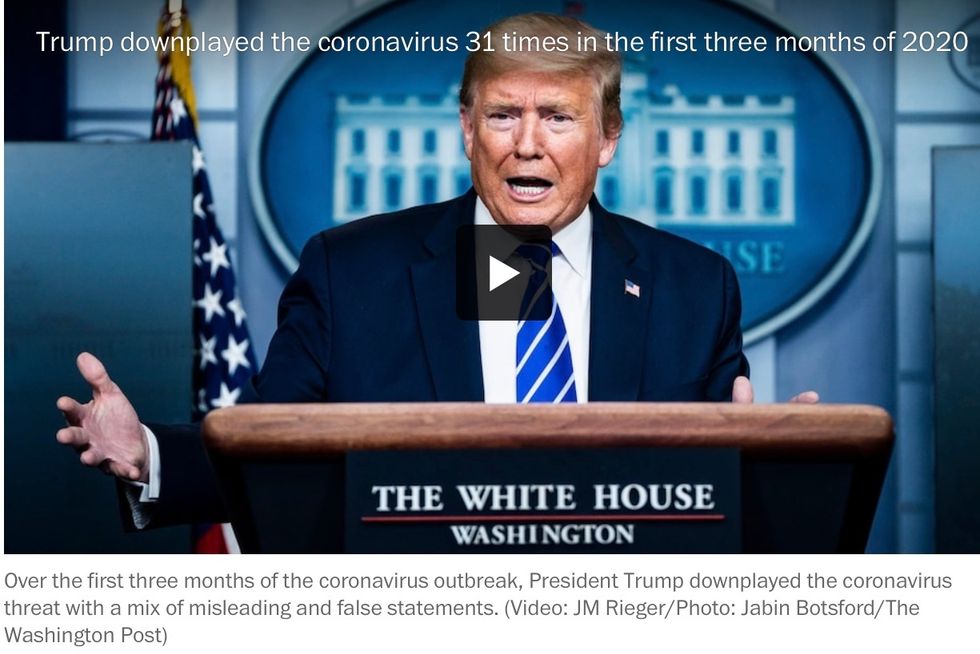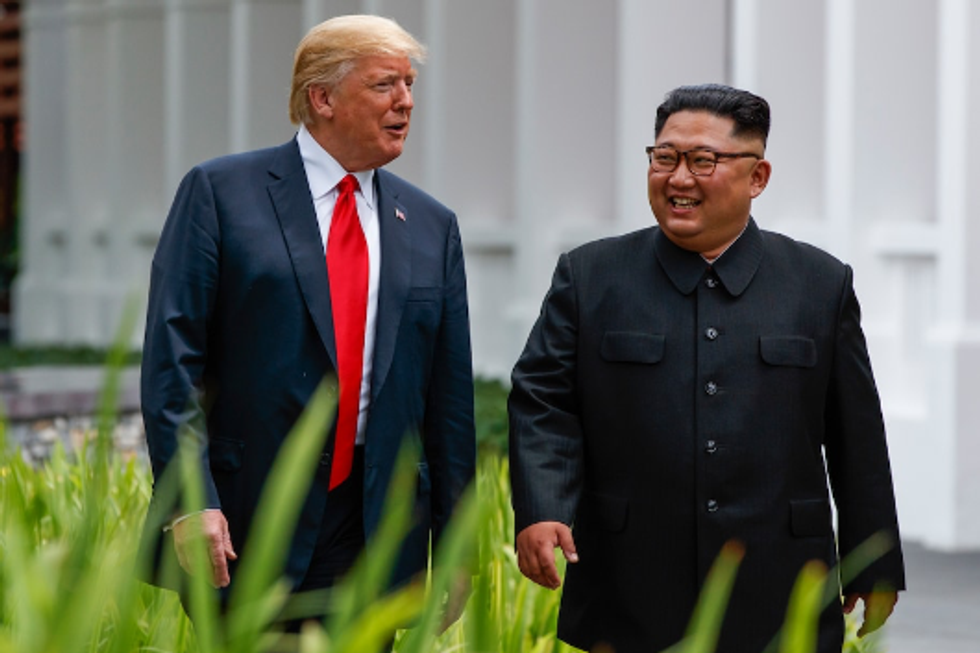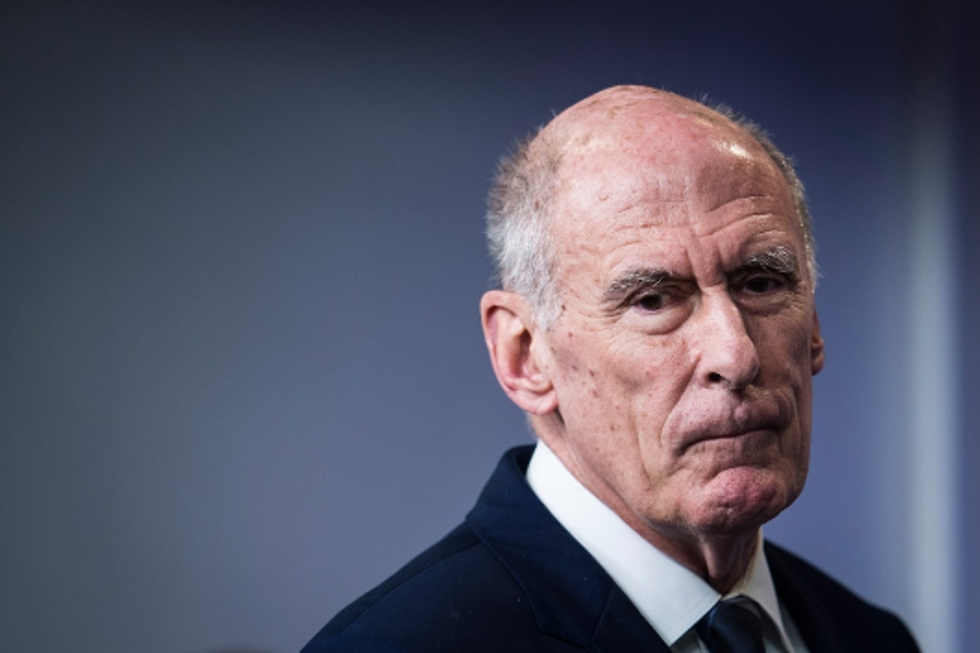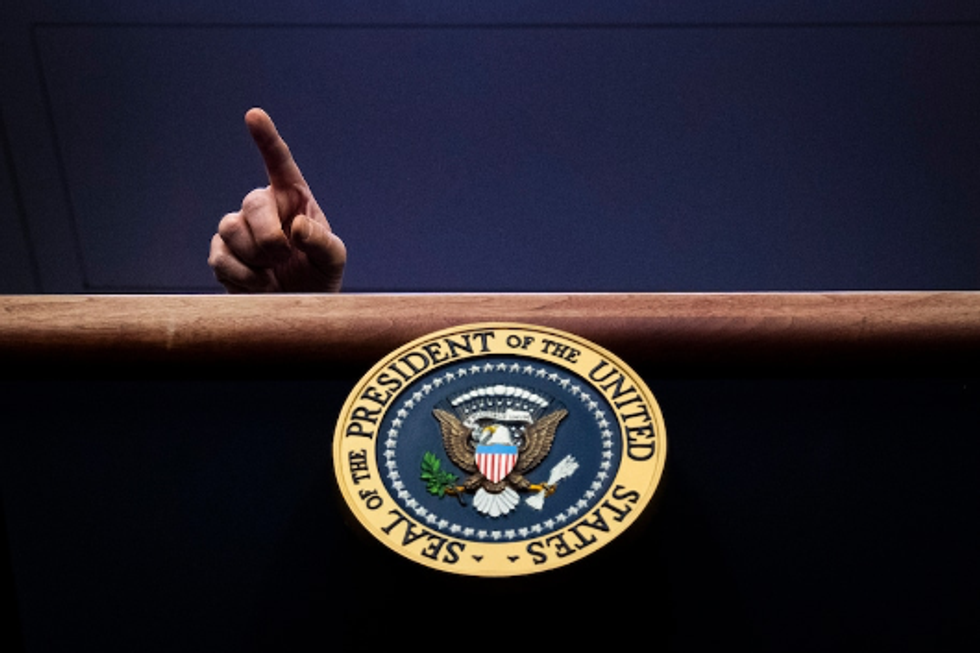President Trump's head popped up during his top-secret intelligence briefing in the Oval Office on Jan. 28 when the discussion turned to the coronavirus outbreak in China.
"This will be the biggest national security threat you face in your presidency," national security adviser Robert C. O'Brien told Trump, according to a new book by Washington Post associate editor Bob Woodward. "This is going to be the roughest thing you face."
Matthew Pottinger, the deputy national security adviser, agreed. He told the president that after reaching contacts in China, it was evident that the world faced a health emergency on par with the flu pandemic of 1918, which killed an estimated 50 million people worldwide.
Ten days later, Trump called Woodward and revealed that he thought the situation was far more dire than what he had been saying publicly.
You just breathe the air and that's how it's passed," Trump said in a Feb. 7 call. "And so that's a very tricky one. That's a very delicate one. It's also more deadly than even your strenuous flu."
"This is deadly stuff," the president repeated for emphasis.
In a Feb. 7 interview, when asked what Chinese President Xi Jinping told him about the virus, Trump says, "This is deadly stuff."... [audio on original Washington Post article...https://www.washingtonpost.com/politics/bob-woodwa...]
At that time, Trump was telling the nation that the virus was no worse than a seasonal flu, predicting it would soon disappear and insisting that the U.S. government had it totally under control. It would be several weeks before he would publicly acknowledge that the virus was no ordinary flu and that it could be transmitted through the air.
70 days: The U.S. was beset by denial and dysfunction as the coronavirus raged
Trump admitted to Woodward on March 19 that he deliberately minimized the danger. "I wanted to always play it down," the president said.
In a March 19 interview, when asked what made him pivot on the gravity of the virus, Trump says, "To be honest with you, I wanted to always play it down." [audio on original Washington Post article...https://www.washingtonpost.com/politics/bob-woodwa...]
Aside from exploring Trump's handling of the pandemic, Woodward's new book, "Rage," covers race relations, diplomacy with North Korea and a range of other issues that have arisen during the past two years.
The book also includes brutal assessments of Trump's conduct from former defense secretary Jim Mattis, former director of national intelligence Daniel Coats and others.
The book is based in part on 18 on-the-record interviews Woodward conducted with the president between December and July. Woodward writes that other quotes in the book were acquired through "deep background" conversations with people in which information is divulged and exchanges recounted without the people being named.
"Trump never did seem willing to fully mobilize the federal government and continually seemed to push problems off on the states," Woodward writes. "There was no real management theory of the case or how to organize a massive enterprise to deal with one of the most complex emergencies the United States had ever faced."
Woodward questioned Trump repeatedly about the national reckoning on racial injustice. On June 3, two days after federal agents forcibly removed peaceful protesters from Lafayette Square to make way for Trump to stage a photo opportunity outside St. John's Church, Trump called Woodward to boast about his "law and order" stance.
"We're going to get ready to send in the military slash National Guard to some of these poor bastards that don't know what they're doing, these poor radical lefts," Trump said.

In another conversation, on June 19, Woodward asked the president about White privilege, noting that they were both White men of the same generation who had privileged upbringings. Woodward suggested that they had a responsibility to better "understand the anger and pain" felt by Black Americans.
"No," Trump replied, his voice described by Woodward as mocking and incredulous. "You really drank the Kool-Aid, didn't you? Just listen to you. Wow. No, I don't feel that at all."
In a June 19 interview, when asked if his privilege means he has to work harder to understand the anger fueling protests, Trump says, "You really drank the Kool-Aid, didn't you?"[audio on original Washington Post article...https://www.washingtonpost.com/politics/bob-woodwa...]
As Woodward pressed Trump to understand the plight of Black Americans after generations of discrimination, inequality and other atrocities, the president kept answering by pointing to economic numbers such as the pre-pandemic unemployment rate for Blacks and claiming, as he often has publicly, that he has done more for Blacks than any president except perhaps Abraham Lincoln.
In another conversation about race, on July 8, Trump complained about his lack of support among Black voters. "I've done a tremendous amount for the Black community," he told Woodward. "And, honestly, I'm not feeling any love."
They spoke again about race relations on June 22, when Woodward asked Trump whether he thinks there is "systemic or institutional racism in this country."
Well, I think there is everywhere," Trump said. "I think probably less here than most places. Or less here than many places."
Asked by Woodward whether racism "is here" in the United States in a way that affects people's lives, Trump replied: "I think it is. And it's unfortunate. But I think it is."
In a June 22 interview, when asked whether there is institutional racism in the U.S., Trump says, "Well I think there is everywhere."[audio on original Washington Post article...https://www.washingtonpost.com/politics/bob-woodwa...]
Trump shared with Woodward visceral reactions to several prominent Democrats of color. Upon seeing a shot of Sen. Kamala D. Harris of California, now the Democratic vice-presidential nominee, calmly and silently watching him deliver his State of the Union address, Trump remarked: "Hate! See the hate! See the hate!" Trump used the same phrase after an expressionless Rep. Alexandria Ocasio-Cortez (D-N.Y.) appeared in the frame.
Trump was dismissive about former president Barack Obama and told Woodward he was inclined to refer to him by his first and middle names, "Barack Hussein," but wouldn't in his company, to be "very nice."
“I don't think Obama's smart," Trump told Woodward. "I think he's highly overrated. And I don't think he's a great speaker." Trump added that North Korean leader Kim Jong Un thought Obama was "an asshole."
“Rage" includes the first reported excerpts of letters Trump exchanged with Kim, and quotes Trump in his interviews with Woodward using expletives to defend their pen-pal relationship. Even as U.S. intelligence chiefs warn that North Korea is unlikely to ever surrender its nuclear weapons and that Trump's approach is ineffective, the president told Woodward he is determined to stay the course and dismissively says the CIA has "no idea" how to handle North Korea.
"I met. Big fucking deal," Trump told Woodward, waving off criticism of his three face-to-face meetings with Kim. "It takes me two days. I met. I gave up nothing."
Foreign affairs experts say Trump gave up much — including by postponing and then scaling back the U.S. joint military exercises with South Korea that had long angered North Korea, as well as by granting Kim the international stature and legitimacy the North Korean regime has long craved.
Trump told Woodward he evaluates Kim and his nuclear arsenal like a real estate target: "It's really like, you know, somebody that's in love with a house and they just can't sell it."
'We fell in love': Trump and Kim shower praise, stroke egos on path to nuclear negotiations
Kim welcomed Trump's overtures with over-the-top prose in letters. Kim wrote that he wanted "another historic meeting between myself and Your Excellency reminiscent of a scene from a fantasy film." And he said his meetings with Trump were a "precious memory" that underscored how the "deep and special friendship between us will work as a magical force."
In another letter, Kim wrote to Trump, "I feel pleased to have formed good ties with such a powerful and preeminent statesman as Your Excellency." And in yet another, Kim reflected on "that moment of history when I firmly held Your Excellency's hand at the beautiful and sacred location as the whole world watched with great interest and hope to relive the honor of that day."

Trump was taken with Kim's flattery, Woodward writes, telling the author pridefully that Kim had addressed him as "Excellency." Trump remarked that he was awestruck meeting Kim for the first time in 2018 in Singapore, thinking to himself, "Holy shit," and finding Kim to be "far beyond smart." Trump also boasted to Woodward that Kim "tells me everything," including a graphic account of Kim having his uncle killed.
Trump did not share his letters to Kim — "Those are so top secret," the president said — though Woodward writes that Trump sent Kim a copy of the New York Times featuring a picture of the two men on the front page. "Chairman, great picture of you, big time," Trump wrote on the paper in marker. (Trump falsely boasted to Woodward: "He never smiled before. I'm the only one he smiles with.")
Trump reflected on his relationships with authoritarian leaders generally, including Turkish President Recep Tayyip Erdogan. "It's funny, the relationships I have, the tougher and meaner they are, the better I get along with them," he told Woodward. "You know? Explain that to me someday, okay?"
'Dictator envy': Trump's praise of Kim widens his embrace of totalitarian leaders
In the midst of reflecting upon how close the United States had come in 2017 to war with North Korea, Trump revealed: "I have built a nuclear — a weapons system that nobody's ever had in this country before. We have stuff that you haven't even seen or heard about. We have stuff that Putin and Xi have never heard about before. There's nobody — what we have is incredible."
Woodward writes that anonymous people later confirmed that the U.S. military had a secret new weapons system, but they would not provide details, and that the sources were surprised Trump had disclosed it.
The book documents private grumblings, periods of exasperation and wrestling about whether to quit among the so-called adults of the Trump orbit: Mattis, Coats and then-Secretary of State Rex Tillerson.
Mattis quietly went to Washington National Cathedral to pray about his concern for the nation's fate under Trump's command and, according to Woodward, told Coats, "There may come a time when we have to take collective action" since Trump is "dangerous. He's unfit."
In a separate conversation recounted by Woodward, Mattis told Coats, "The president has no moral compass," to which the director of national intelligence replied: "True. To him, a lie is not a lie. It's just what he thinks. He doesn't know the difference between the truth and a lie."
Woodward describes Coats's experience as especially tortured. Coats, a former senator from Indiana, was recruited into the administration by Vice President Pence, and his wife is quoted as recalling a dinner at the White House when she interacted with Pence.
"I just looked at him, like, how are you stomaching this?" Marsha Coats said, according to Woodward. "I just looked at him like, this is horrible. I mean, we made eye contact. I think he understood. And he just whispered in my ear, 'Stay the course.' "

Pence was the president's one constant booster publicly and privately in Woodward's book. When Dan Coats considered resigning because of Trump's handling of Russia, Pence urged him to "look on the positive side of things that he's done. More attention on that. You can't go."
Mike Pence hopes four years of subservience to Trump will lift his political future
The loathing was mutual. "Not to mention my fucking generals are a bunch of pussies. They care more about their alliances than they do about trade deals," Trump told White House trade adviser Peter Navarro at one point, according to Woodward.
Jared Kushner, the president's son-in-law and senior adviser, is quoted by Woodward as saying, "The most dangerous people around the president are overconfident idiots," which Woodward interprets as a reference to Mattis, Tillerson and former National Economic Council director Gary Cohn.
Kushner was a frequent target of ire among Trump's Cabinet members, who saw him as untrustworthy and weak in dealing with heads of states. Tillerson found Kushner's warm dealings with Israeli Prime Minister Benjamin Netanyahu "nauseating to watch. It was stomach churning," according to Woodward.
Kushner is quoted extensively in the book ruminating about his father-in-law and presidential power. Woodward writes that Kushner advised people that one of the most important guiding texts to understand the Trump presidency was "Alice in Wonderland," a novel about a young girl who falls through a rabbit hole. He singled out the Cheshire cat, whose strategy was endurance and persistence, not direction.
The book charts the Trump administration's failings and missteps on the pandemic, as well as the decisions and actions of Pottinger, Centers for Disease Control and Prevention Director Robert Redfield, infectious-disease expert Anthony S. Fauci and others.
Fauci at one point tells others that the president "is on a separate channel" and unfocused in meetings, with "rudderless" leadership, according to Woodward. "His attention span is like a minus number," Fauci said, according to Woodward. "His sole purpose is to get reelected."
In one Oval Office meeting recounted by Woodward, after Trump had made false statements in a news briefing, Fauci said in front of him: "We can't let the president be out there being vulnerable, saying something that's going to come back and bite him." Pence, Kushner, Chief of Staff Mark Meadows and senior policy adviser Stephen Miller tensed up at once, Woodward writes, surprised Fauci would talk in front of Trump that way.
Woodward describes Fauci as particularly disappointed in Kushner for talking like a cheerleader as if everything was great. In June, as the virus was spreading wildly coast to coast and case numbers soared in Arizona, Florida, Texas and other states, Kushner said of Trump, "The goal is to get his head from governing to campaigning."
Woodward writes that Sen. Lindsey O. Graham (R-S.C.) suggested former president George W. Bush speak personally with Trump about global vaccine efforts, but that Bush demurred.
"No. No," Bush told Graham, according to Woodward. "He'd misconstrue anything I said."
In their final interview, on July 21, Trump vented to Woodward, "The virus has nothing to do with me. It's not my fault."

Robert Costa and Philip Rucker, Washington Post, September 9, 2020
###
September 9, 2020
Voices4America Post Script. Starting on Jan. 28, Trump knew the coronavirus was 'deadly', while 31 times, on TV and inpress conferences, he minimized the impact of the virus and chose not to take action against it. #ThousandsDied #TrumpLied Read also what Mattis and Dan Coats said about him. #BidenHarris2020
Remember, Woodward has 18 recordings with Trump.
Remember Trump said, on July 21, "The virus has nothing to do with me. It's not my fault."
I thought Trump said 31 times, that the virus would soon disappear. I miscounted. 32 times. https://www.washingtonpost.com/video/politics/32-times-trump-said-the-coronavirus-would-go-away/2020/04/30/d2593312-9593-4ec2-aff7-72c1438fca0e_video.h

